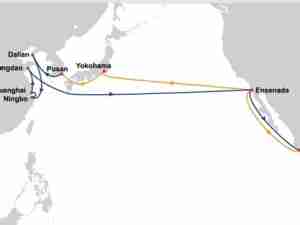Joe Canadian Spurns Archaic Trade Laws With 15 Cases of Beer
By: Josh Wingrove | May 16 2016 at 12:01 AM | Liner Shipping
His name is Gerard Comeau, though his lawyer calls him “Joe Canadian.” A retired steelworker with a taste for beer and a frugal streak, he’s the unlikely face of a revolt.
And yet a shopping trip by Comeau to pick up 15 cases of beer in 2012—some 354 bottles and cans—triggered a legal fight that shook the ground on which rest many of Canada’s arcane inter-provincial trade rules.
Comeau’s penalty for illegally bringing alcohol across a provincial border was tossed out last month when a judge ruled such bans were unconstitutional. While Comeau’s lawyer says the case is a victory for small brewers and could hurt giants like Anheuser-Busch InBev SA and Molson Coors Brewing Co., the case goes far beyond beer and is spurring a renewed push to overhaul Canada’s complex web of internal trade barriers that add another drag to an economy already grappling with an oil-price shock.
Free internal trade could boost Canada gross domestic product by at least 3 percent, one study found—or triple the impact of the fiscal stimulus Prime Minister Justin Trudeau’s government is boasting about overseas.
“The ramifications now are extensive,” said Arnold Schwisberg, who represented Comeau. With the April decision, the lawyer said the court “found emphatically and clearly that our fathers of confederation intended Canada to be a free-trade zone among our provinces.”
‘Still Stuck’
The isolationist trade rules erect a series of barriers between the country’s 10 provinces. Truckers face different safety rules, firms are barred from bidding on certain contracts on which foreign companies are permitted to compete, workers’ compensation rules are not consistent and professional and trade accreditation often doesn’t carry over.
All these hurdles have been targeted by the federal government in the past as a barrier to growth. It’s the liquor rules, however, that tend to crystallize debate. “Almost any adult can relate to how stupid it is,” said Laura Jones, executive vice president of the Canadian Federation of Independent Business, a lobby group. “We’re still stuck with this old-fashioned agreement.”
The cost is unclear. Government officials don’t have an exact figure but have estimated it’s in the tens of billions. The CFIB pegs it at C$14 billion ($10.8 billion), and one recent academic study put it between 3 percent and 7 percent of GDP, or C$50 billion to C$130 billion a year.
Unnecessary Hurdles
The biggest impact isn’t on consumer goods like booze, but on procurement and labor mobility that stifle growth, said Mathew Wilson, senior vice president of the Canadian Manufacturers & Exporters trade group. “It’s that kind of stuff that drives companies crazy because it limits their ability to draw in the talent they need to expand their operations,” he said.
Canada’s premiers pledged in 2014 to rewrite existing internal trade rules, setting a deadline of March 2016. There’s no sign yet of a pact. Brad Duguid, Ontario’s minister of economic development and chairman of provincial talks on the topic, said it’s “imperative that we eliminate these trade barriers” and a deal will be reached this year.
The delays mystify University of Calgary economist Trevor Tombe, who co-authored the cost study. “If they don’t want to lower the barriers for some particular reason, then they should say so rather than simply drag their feet,” he said.
Brewer’s Lament
The barriers also befuddle Steve Beauchesne and his family, who started making beer near Canada’s capital in 2006. Beau’s All Natural Brewing Co. lies just outside Ottawa, an Ontario municipality near the border with Quebec, yet it took eight years to figure out how to sell in the neighboring province.
“It’s far easier to get your beer into other countries than it is to get it into other provinces,” said Beauchesne, who expanded into New York state before reach Quebec just 15 kilometers (9.3 miles) away. “What it means is beer from one province is treated as a complete foreign export.”
Beau’s, which sold 5 million liters of beer in 2015, briefly considered starting a second brewery across the provincial border. Instead, it found another route: Beau’s sells its beer to Quebec’s government-run distributor, then buys it back to warehouse and distribute locally within the province—a system that took 15 months to set up.
The court ruling will help small brewers like Beau’s reach new customers, Schwisberg said. Beer Canada, an industry group, declined requests for comment. It doesn’t disclose market-share data, though recent studies suggest Molson Coors and Anheuser-Busch control between 60 and 80 percent of Canada’s market.
Past Attempts
Previous governments have pushed, to no avail, to convince provinces to agree to reduce barriers and abandon their protectionist tendencies. Former Industry Minister James Moore said his Conservatives made progress on the file but the need for reduced inter-provincial trade barriers is greater than ever, given the rise of anti-trade rhetoric in Europe and the U.S.
“We have to make the Canadian economy as efficient as possible domestically so we can protect ourselves from some of these challenges,” said Moore, who didn’t seek re-election last year. “Everyone always asks where is the next BlackBerry, where is the next big Canadian brand? Well, we hobble ourselves when we don’t allow companies to grow beyond local and regional players.”
Innovation Minister Navdeep Bains, who inherited the file as head of the renamed industry department under Trudeau’s Liberals, applauded the ruling in Comeau’s case, saying he hopes it will lead at last to an agreement between provinces to reduce tariffs. “I personally am a big fan of the reduction of regulations when it comes to inter-provincial trade barriers,” Bains told reporters at the beginning of May.
A Frothy Haul
Comeau, who hails from a small town in the Atlantic province of New Brunswick, went across the river to Quebec on a Saturday. Police watched him enter three different stores and later stopped his car. They found 48 bottles of Sleeman’s Light, 48 bottles of Miller Genuine Draft, 48 bottles of Molson M, 60 bottles of Budweiser Light, 60 bottles of Budweiser, 90 cans of Coors Light, 2 bottles of whiskey and one bottle of “Stinger Premixxx” liqueur. Police handed him a C$292.50 ticket.
The ruling in his case found that Canada’s 1867 Constitution Act intended to gain “unfettered economic exchange and a more comprehensive economic union.” The decision is from a lower court and therefore isn’t binding nationwide. The New Brunswick government is weighing an appeal, but could risk giving the judgment more weight if it’s upheld.
Schwisberg said he hopes the decision will be replicated in other provinces to fight restrictions including Canada’s system of supply management in the dairy sector. Comeau, meanwhile, emerged from the ruling jubilant, telling local reporters: “I’m thirsty!”





